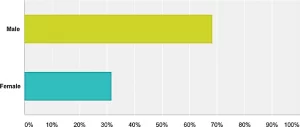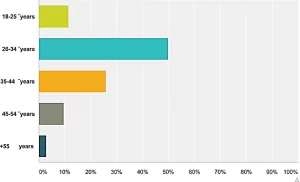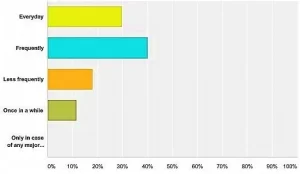The chapter provides the results of the questionnaire and semi-structured interview questions. These results were further analysed to produce meaningful findings that are discussed in detail throughout the chapter. It was essential to appropriately analyse these findings to produce recommendations for implementing this technology in Libya. To establish an AD plant in a specific locality, it needs to consider multiple factors to attain maximum benefits.

An online survey questionnaire was prepared and kept online for 20 days to gather as much data as possible to make accurate estimations and derive statistics about food waste and the type of food waste. The sample size of the population was estimated to be 100; however, 112 people returned completed questionnaires. Based on a gender categorisation 76
male and 36 females, as shown in Figure 13 participated in the survey. Almost all age groups gave their poll, but mostly the survey questionnaire was filled by people in the age bracket of 26-34 years, as shown in Figure 14.

About 69.90 percent of the people were students, while the other 21.25 percent were professionals in various fields. Of the total sample size, 28.43 percent belonged to rural areas, and 71.57 percent belonged to urban areas. Most of the people belonged to Tripoli city or nearby areas, as shown in Figure 7. It verifies their familiarity with the city and its requirements. The questionnaire contains 27 questions in total, including many aspects of the research to obtain the qualitative type of data relevant to the research.
Since Tripoli has been rich enough in oil reservoirs, fossil fuels are a primary electricity generation source. According to the survey, oil is the most used electricity generation source in Libya, Figure 16. Keeping in mind the expected exhaustion of natural resources with the increasing population and electricity demands in Tripoli, the capital and one of Libya’s largest populated cities, there needs to be a shift from national grids to renewable electricity generation methods. In the survey, people were asked how often they undergo electricity outages and above 40 percent answered with ‘frequently’, while above 29 percent said they face shortfalls every day. Hence, Tripoli city’s current scenario demands an alternative energy generation method to be adopted along with the conventional energy generation plants to avoid scarcity of natural resources in the future.

If you are the original writer of this Dissertation Chapter and no longer wish to have it published on the www.ResearchProspect.com then please:
To write the Results chapter of a dissertation: